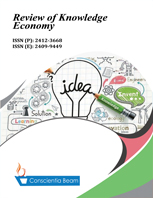Implementing E-Learning in Far Western Region of Nepal
DOI:
https://doi.org/10.18488/journal.67.2018.51.1.20Abstract
The rapid developments of internet and communication technologies have materially altered many characteristics and concepts of the learning environment. E-learning is highly beneficial to developing countries and believed to have high potential for governments struggling to meet a growing need of education while facing shortage of expert teachers, shortage of update textbooks and limited teaching materials. The objective of this study is to investigate the vital challenges of implementing e-learning systems in far western region of Nepal. The results of this study provided basic mechanism for improving higher education in developing countries. There are a number of commercial or free e-learning systems in the market. Majority of these e-learning systems provide lot of functions and modules. Some courses are entirely based on e-learning instead of traditional learning model. E-learning system also offers graphs and charts of student's results. This system is based on linear workflow. That means students can see new learning resources and tests only after previous was done. Students can also create their own learning plan by defining dates. System is able to export this plan into general calendar format or remind students via e-mail.

